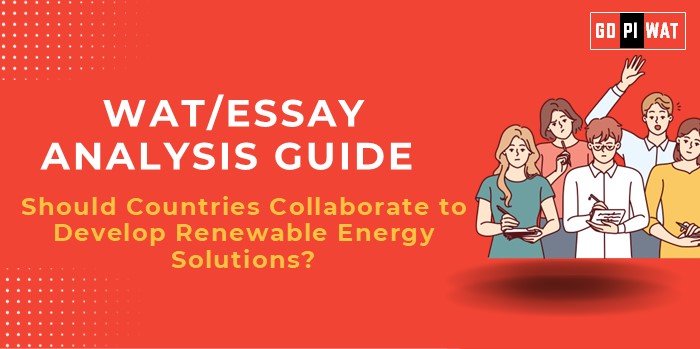📋 Written Ability Test (WAT)/Essay Analysis Guide
💡 Topic: Should Countries Collaborate to Develop Renewable Energy Solutions?
🌟 Understanding the Topic’s Importance
Renewable energy collaboration embodies economic efficiency and environmental responsibility. For B-school applicants, it connects deeply with themes of global leadership, innovation, and strategic management.
⏱️ Effective Planning and Writing
- ⏳ Time Allocation:
- Planning: 5 minutes
- Writing: 20 minutes
- Reviewing: 5 minutes
- 💡 Preparation Tips: Gather statistics on renewable energy investments, innovations, and international case studies.
✍️ Introduction Techniques for Essays
- ⚖️ Contrast Approach: “Despite technological advancements, 70% of global energy still comes from non-renewable sources. Collaboration can shift this paradigm.”
- 🔑 Solution-Based Approach: “Global collaboration on renewable energy is the only way to address energy security and climate change simultaneously.”
🧩 Structuring the Essay Body
- 🏆 Achievements:
- Discuss technological progress and cost reductions in renewables.
- ⚠️ Challenges with Comparative Analysis:
- Include funding gaps and geopolitical barriers, using examples from the US and China.
- 🌍 Future Outlook:
- Explore emerging collaborations and potential breakthroughs, such as AI-driven energy grids.
📄 Concluding Effectively
- ⚖️ Balanced Conclusion: “While global renewable energy collaboration faces hurdles, its benefits in cost-sharing and innovation make it indispensable.”
- 🌐 Global Comparison Conclusion: “Learning from Denmark’s wind energy or China’s solar initiatives, countries can scale efforts effectively through collaboration.”
📊 Analyzing Successes and Shortcomings
- 💪 Key Achievements: Global R&D collaborations have led to cost-effective solutions.
- ⚠️ Ongoing Challenges: Lack of infrastructure in developing nations.
- 🌍 Global Context: EU’s cross-border grids as a benchmark.
🔑 Recommendations for Sustainable Progress
- ✨ Incentivize cross-border research initiatives.
- 💰 Create equitable funding mechanisms for low-income nations.
- 🤝 Foster public-private partnerships to expedite innovation.
📝 Sample Short Essays
⚖️ Balanced Perspective:
“Renewable energy collaboration is critical to mitigate climate change. By pooling resources and expertise, nations can drive down costs and foster innovation. However, challenges like geopolitical tensions and funding disparities must be addressed for equitable progress.”
🔑 Solution-Oriented:
“Global collaboration in renewable energy presents an unparalleled opportunity to address energy and climate crises. Initiatives like ISA demonstrate how joint efforts can scale renewables, provided funding and inclusivity are prioritized.”
🌍 Global Comparison:
“Countries like Denmark and China showcase the power of focused renewable energy policies. If nations collaborate, leveraging such models, global renewable energy goals can be achieved faster and more effectively.”


